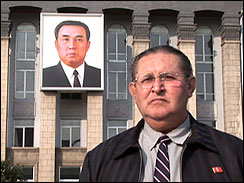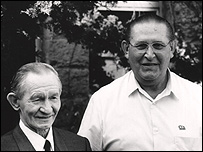 The folks who brought us “The Game of their Lives” and “A State of Mind” have delivered their third DPRK-based documentary, “Crossing the Line” about four American soldiers that defected to the DPRK. It was shown at the Sundance Film Festival this week, and sorry to Simon, Nick and Dan that you did not win.
The folks who brought us “The Game of their Lives” and “A State of Mind” have delivered their third DPRK-based documentary, “Crossing the Line” about four American soldiers that defected to the DPRK. It was shown at the Sundance Film Festival this week, and sorry to Simon, Nick and Dan that you did not win.
A section of the interview with the last remaining defector, James Dresnok, was aired on CBS this week. It was very interesting, not only because we get a glimpse into the life of Dresnok, but also his children. Click here to see the video clip.
The story below was also published in the BBC.
BBC
1/23/2007
 In the 1960s four US soldiers separately defected to North Korea, and were little heard from again.
In the 1960s four US soldiers separately defected to North Korea, and were little heard from again.
Now one – the last known former American GI left in the country – has spoken for the first time to British documentary-makers.
James Dresnok is something of a celebrity around the North Korean capital Pyongyang, his home for the last 44 years.
Unmissable thanks to his 6ft 5in height and bulky frame, the 64-year-old has appeared in North Korean films, taught English at university and been a propaganda hero for the Communist nation.
“I have never regretted coming to [North Korea]. I feel at home,” he says, in the documentary Crossing the Line, which premiered at the US Sundance Film Festival on Monday.
James Dresnok was a 21-year-old army private when he decided to leave his post in South Korea one August afternoon in 1962 to cross into the North.
Three months earlier, Private Larry Abshier had become the first known US soldier to defect to the North, while patrolling the demilitarised zone between the two Koreas.
In the three years that followed, Specialist Jerry Parrish and Sergeant Charles Jenkins would follow Abshier and Dresnok across the border.
The four, who initially lived in the same house, found their new life tough in the early years. Mr Dresnok admits he did not want to stay. “I didn’t think I could adapt”.
A joint bid for asylum at the Soviet embassy in 1966 was rejected and the four were forced to undergo intense re-education, which included learning North Korea’s official Juche ideology.
It was at that point, Mr Dresnok says, that he decided he would try to fit in. “Man is the master of his life, and little by little I came to understand the Korean people,” he said.
All four married, were granted North Korean citizenship and – apart from starring as evil capitalists in a propaganda film called Nameless Heroes in 1978 – appeared to drop off the face of the earth.
In fact, so little was known about them that Larry Abshier had been dead for 13 years when the US defence department said, in 1996, it believed all four men were still alive. Jerry Parrish had in fact died in 1996.
Persistence
UK documentary-maker Daniel Gordon and his Beijing-based co-producer Nick Bonner were already familiar to North Korea’s film-making authorities when they asked them about the rumours of the four defectors.
Their 2002 film, The Game of Their Lives – about the North Korean football team that beat Italy in the 1966 World Cup and qualified for the quarter finals – had been a huge hit in the country.
They were working on their second film, A State of Mind – following two North Korean schoolgirls preparing for the mass games – when they asked for permission to make a film about Mr Dresnok and the others.
“We were initially told it was absolutely impossible,” Mr Gordon explained, “but we took that to mean it was possible.”
In June 2004, at a meeting they thought would be with the North Korean authorities, the filmmakers were brought face-to-face with James Dresnok and Charles Jenkins for the first time.
“The two men weren’t wholeheartedly keen on making the film. It had the potential to blow up in their faces. But at the end of the two-and-a-half hour meeting, they had come round,” Mr Gordon said.
Within five weeks of the meeting, however, Charles Jenkins’ story became known to the whole world when he left North Korea to be reunited with his wife in Japan.
Privileged
While the documentary is about all four defectors, the focus is undoubtedly on James Dresnok who is filmed fishing, going to a restaurant, the opera and having a medical check-up.
“I found him a fascinating guy,” Daniel Gordon says. “He has had such a unique experience of life.
“It is hard to understand from our perspective why an American soldier would choose to make his life in arguably the biggest US-hating nation on earth.”
James Dresnok describes how an unstable childhood and his first wife’s infidelity left him with a sense of hopelessness before he crossed the line into the North.
Since his defection, he has been married twice and has three children.
He taught languages and carried out translating work even though he, like the other three, had dropped out of school by the age of 15.
And he also appeared in several other films, apart from Nameless Heroes, and is still referred to as Arthur after a character he once played.
Mr Dresnok admits he lives a privileged life by North Korean standards, confessing that he got rice rations during the deadly famines of the late 1990s while others were starving.
“The government is going to take care of me until my dying day,” he tells the documentary team.


 The folks who brought us “
The folks who brought us “ In the 1960s four US soldiers separately defected to North Korea, and were little heard from again.
In the 1960s four US soldiers separately defected to North Korea, and were little heard from again.